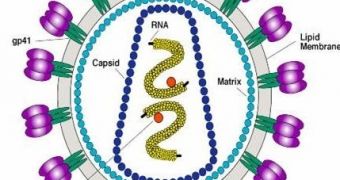By now, HIV-1 has killed over 20 million people and about 35 million live with the infection. The race is desperate for stopping the pandemics and this new discovery is a real breakthrough: a semen chemical boosts HIV's ability to enter human cells. Potential inhibitors of prostatic acidic phosphatase, (PAP) incorporated into new microbicides, could stop the spread of the virus.
In fact, the team led by Frank Kirchhoff at the University Clinic of Ulm (Germany), was looking for semen chemicals that could inhibit HIV transmission!... When focusing on PAP, the researchers discovered that this molecule formed tiny fibres (called amyloid fibrils) that could transport the virus into its host immune cells.
"Most enhancers have maybe a two or three-fold effect, but here the effect was amazing - more than 50-fold and, under certain conditions, more than 100,000-fold. At first, I didn't believe it, but we ran the experiment over and over, always with the same result", said Kirchhoff.
"The fibrils act like a ferry. They pick the viruses up and then bring them to the cell", said co-author Wolf-Georg Forssmann, of the Hannover Medical School, Germany.
The tests revealed that the fibrils boosted the infection especially when the viral load was low, like when HIV-1 is transmitted through sex. Most HIV infections are caused by genital exposure to the semen of HIV-positive men. That's how women make 60 % of the new infections in Africa (which counts with over 90 % of the world's infections).
"I hope that agents that block PAP may be developed and added to vaginal microbicides that women can use to protect themselves from infection. The discovery could have important implications for researchers hunting an elusive HIV vaccine", said Kirchhoff.
"There is much work to be done before new microbicides could be produced as a result of the findings. The ability of HIV-positive women to infect men suggest (also) that the presence of seminal PAP fibrils was not always required for infection to occur", said Jonathan Weber, an eminent HIV researcher at Imperial College London, UK, who admitted the importance of the new discovery.

 14 DAY TRIAL //
14 DAY TRIAL //